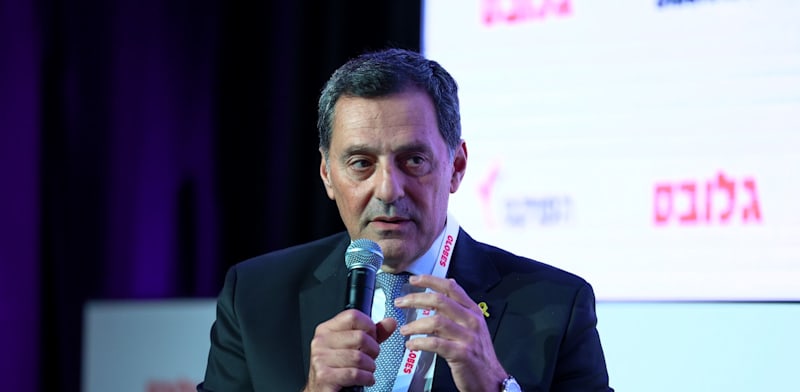Tomorrow (Wednesday), the conclusions of the Dayan committee will likely be revealed at a press convention. The committee will make its suggestions on the amount of Israeli fuel that should be offered solely in Israel and the way a lot it is going to be permissible to export, what is going to occur to the possession mannequin and competitors within the sector, and a variety of different regulatory issues.
In line with info that has reached “Globes, the committee will go away the duty to order fuel for the native market unchanged (440 BCM), and thus resolve that, except extra reserves are discovered, the period of Israeli fuel will come to an finish round 2045, after which a lot of the pure fuel consumed in Israel should come from imports.
As well as, the committee just isn’t anticipated to advocate obliging Chevron to promote one in every of its reservoirs because the Ministry of Finance needed. However though, generally, the committee accepted the stance of the Ministry of Vitality and Infrastructure, the controversial selections are anticipated to offer rise to minority opinions in its report.
The official title of the committee, headed by Ministry of Vitality and Infrastructure director normal Yossi Dayan, is the Inter-Ministerial Committee for Analyzing Coverage on the Pure Fuel Business and Strengthening Vitality Safety. It met for the primary time in February 2924 to set pure fuel coverage for Israel for the approaching years. It has needed to resolve the way to stability a number of pursuits: vitality safety; competitors that may convey down costs; and encouragement of funding and exploration. These pursuits don’t essentially coincide. Export restrictions, for instance, assist in some respects however hinder in others.
The committee has eleven members: 4 from the Ministry of Vitality and Infrastructure, and representatives of the Ministry of Finance Budgets Division, the Nationwide Financial Council, the Nationwide Safety Council, the Competitors Authority, the Ministry of International Affairs, the Ministry of Environmental Safety, and the Ministry of Justice.
The primary and possibly most essential challenge is the duty to produce the wants of the native market. Assuming that no extra massive fuel reservoirs are found in Israeli waters, the quantity of fuel held by Israel is restricted, and the nation has to resolve how a lot it is going to enable to be exported, and the way a lot it is going to retain for inside consumption solely.
On the one hand, protecting the fuel for the long run will strengthen Israel’s vitality independence and scale back the necessity for imports, and postpone the time from which we should wean ourselves off a budget fuel that we presently take pleasure in. However, exports usher in massive tax revenues (on increased gross sales costs), and symbolize a diplomatic lever on Egypt and Jordan, and an essential incentive for fuel exploration and improvement that would enlarge the availability.
RELATED ARTICLES
The dispute on the committee, which reached an in depth vote on the matter, was over two predominant prospects: a proposal by the Ministry of Vitality and Infrastructure to maintain the duty to produce the native economic system at 440 BCM; and a proposal supported by the Ministry of Finance Budgets Division to lift the quantity to 515 BCM out of the 850 BCM that, based on the estimates of the Ministry of Vitality and Infrastructure, Israel’s confirmed reserves comprise (the fuel producers put the quantity at over 1,000 BCM). Assuming that world pure fuel costs proceed to be pretty excessive, the remainder of the fuel will likely be for export, primarily to Israel’s neighbors Egypt and Jordan.
In line with sources on the committee, the Ministry of Vitality and Infrastructure, along with the Nationwide Financial Council, obtained a majority in favor of reserving the smaller amount for home use. The Ministry of Finance and others on the committee might want to append a minority opinion to its report.
The choice implies that, from 2045, a lot of the fuel utilized in Israel will likely be imported, because the Tamar reservoir will likely be exhausted. That is on the idea of the conservative assumption that by then Israel will generate solely 18% of its vitality wants from renewable sources. This compares with a goal of 30%. On the finish of 2024, the proportion was 14%. Sources on the committee stated that “This is a crucial name, as a result of the economic system has to begin planning for the day after, and there’s now higher readability about the necessity to put together for the post-gas period.”
The committee is anticipated to advocate beginning now on preparations for vitality imports, which might be through pipelines or within the type of liquid pure fuel introduced by ship. The committee additionally mentions nuclear vitality as a chance for diversifying and securing Israel’s vitality provide after its fuel runs out.
Prohibit Chevron?
One other predominant challenge, raised by the Ministry of Finance Budgets Division, and even raised publicly by the division’s head Yogev Gradus, was the proposal to take away Chevron from one of many fuel reservoirs. This might be a radical regulatory measure, and Chevron reacted sharply to the likelihood. It seems that the Ministry of Vitality and Infrastructure additionally sees it as an excessive proposal, as drastic restrictions on the possession construction of the reservoirs could be liable to discourage different main international gamers from investing in growing Israel’s fuel reserves.
As an alternative, the committee prefers analyzing extra reasonable prospects, equivalent to separate gross sales by every of the companions in a reservoir, and a neighborhood fuel change that may facilitate gross sales at costs outdoors of standard provide contracts.
That is the primary committee to find out that Israel will stop to rely by itself fuel inside a sure time. It may have extended the interval, nevertheless it selected not to take action as a way to create certainty for the fuel corporations and shoppers alike.
The Ministry of Finance Budgets Division acknowledged in response to the report: “We is not going to remark earlier than the report is printed.”
The Ministry of Vitality and Infrastructure stated in response: “The committee’s suggestions create the correct stability between the wants of the native economic system and sustaining the State of Israel as a pretty atmosphere for funding, all in most people curiosity.
“From the committee’s dialogue and in analyses of future provide and demand, it emerges that Israel’s current pure fuel reserves are ample for the wants of the economic system for at the least 25 years, on the idea of conservative assumptions. All of the horror eventualities offered within the media by numerous events are baseless.
“In its suggestions, the committee gave high precedence to the general public curiosity, and any suggestion in any other case is unfaithful.”
Revealed by Globes, Israel enterprise information – en.globes.co.il – on April 8, 2025.
© Copyright of Globes Writer Itonut (1983) Ltd., 2025.





